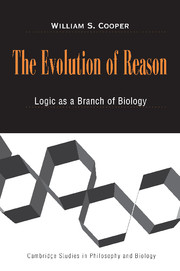Book contents
- Frontmatter
- Contents
- Foreword
- 1 The Biology of Logic
- 2 The Evolutionary Derivation of Life-History Strategy Theory
- 3 The Evolutionary Derivation of Decision Logic
- 4 The Evolutionary Derivation of Inductive Logic (Part I)
- 5 The Evolutionary Derivation of Deductive Logic
- 6 The Evolutionary Derivation of Inductive Logic (Part II)
- 7 The Evolutionary Derivation of Mathematics
- 8 Broadening the Evolutionary Foundation of Classical Logic
- 9 The Evolutionary Derivation of Nonclassical Logics
- 10 Radical Reductionism in Logic
- 11 Toward a Unified Science of Reason
- Appendix: Formal Theory
- References
- Index
7 - The Evolutionary Derivation of Mathematics
Published online by Cambridge University Press: 18 December 2009
- Frontmatter
- Contents
- Foreword
- 1 The Biology of Logic
- 2 The Evolutionary Derivation of Life-History Strategy Theory
- 3 The Evolutionary Derivation of Decision Logic
- 4 The Evolutionary Derivation of Inductive Logic (Part I)
- 5 The Evolutionary Derivation of Deductive Logic
- 6 The Evolutionary Derivation of Inductive Logic (Part II)
- 7 The Evolutionary Derivation of Mathematics
- 8 Broadening the Evolutionary Foundation of Classical Logic
- 9 The Evolutionary Derivation of Nonclassical Logics
- 10 Radical Reductionism in Logic
- 11 Toward a Unified Science of Reason
- Appendix: Formal Theory
- References
- Index
Summary
The final step up the ladder of reducibility leads from deductive logic to general mathematics. It is already a well-trodden path, for it has much in common with a famous position in the philosophy of mathematics known as logicism. The so-called logicist thesis asserts, roughly, that mathematics is reducible to pure logic. The doctrine is closely associated with Bertrand Russell and Alfred North Whitehead's Principia Mathematica (1910), widely acknowledged to be an intellectual monument of the twentieth century.
It would be impractical to present here the particulars of the logicist reduction of mathematics, and unnecessary too as so much has been written about it elsewhere. The discussion will be confined therefore to some remarks about how logicism fits in with evolutionary reductionism. The commentary will of necessity be tentative and incomplete, as this is an especially delicate stage of the reduction. It will not be suggested that this final step up the ladder has been established with finality, but only that it is worthy of consideration; and that in case the reader has already considered and rejected the logicist thesis, that it be reconsidered in the light of the reductionist program. Some of the more troubling aspects of logicism simply do not arise in the reductionist context.
LOGICISM
In the latter part of the nineteenth century the ground was prepared for a logical reduction of mathematics by such figures as Boole, Peano, and Dedekind. It was recognized that natural numbers can be described axiomatically; that signed, rational, real, and complex numbers are reducible to natural numbers; and that there is an algebra for combining propositions. A comprehensive truth-functional logic was developed by Gottlob Frege.
- Type
- Chapter
- Information
- The Evolution of ReasonLogic as a Branch of Biology, pp. 125 - 135Publisher: Cambridge University PressPrint publication year: 2001

